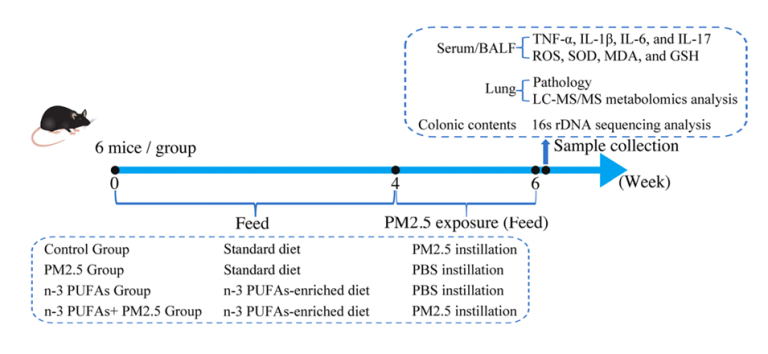Fine particulate matter (PM2.5) is one of the major global air pollutants and has been posing a significant threat to public health in recent years. Short-term or long-term exposure to PM2.5 has been associated with an increased incidence of respiratory diseases, for example, chronic obstructive pulmonary disease (COPD), asthma, and even lung cancer.
Currently, the diet-gut-physiology axis is of wide interest to researchers. There is growing experimental evidence of an important interaction between the gut microbiota and the lung, which is referred to as the “gut-lung axis”. Gut flora may influence the immune status of the lung through the gut-pulmonary axis, while lung inflammation may alter the gut flora through the lung-gut axis.
In a recent study, experimenters investigated the effects of omega-3 polyunsaturated fatty acid supplementation on oxidative stress, inflammation, lung metabolic profile, and gut microbiota in mice with PM2.5-induced lung injury through a series of experiments (the experimental design shown is in the figure below).
The results revealed that omega-3 polyunsaturated fatty acids ameliorated lung histopathological damage as well as reduced pulmonary and systemic inflammatory responses and oxidative stress in PM2.5-induced lung injury and also affected PM2.5-induced lung metabolite profiles and modulated the gut microbiota in mice. The study showed that supplementation with omega-3 polyunsaturated fatty acids was effective in reducing PM2.5-induced lung injury, indicating that the intervention exhibited preventive and therapeutic potential.

Li, J., Chen, Y., Shi, Q., Sun, J., Zhang, C., & Liu, L. (2023). Omega-3 polyunsaturated fatty acids ameliorate PM2. 5 exposure induced lung injury in mice through remodeling the gut microbiota and modulating the lung metabolism. Environmental Science and Pollution Research, 1-17. [Link]
